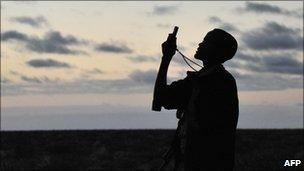Al-Shabab bans mobile phone money transfers in Somalia
- Published

Somali Islamist group al-Shabab has ordered mobile phone companies to stop their popular money transfer services, saying they are "unIslamic".
Mobile phone banking was introduced in the northern Somaliland region in 2009 and has now spread across the country.
Al-Shabab and its allies control much of southern Somalia and one mobile phone company official said he had "no option but to obey" the order.
Despite years of conflict, Somalia's telecommunications sector is thriving.
Mobile phones are a common sight in the capital, Mogadishu, and three companies currently offer mobile phone banking.
But the al-Qaeda linked group has given them three months to stop.
Harder to trace?
Al-Shabab says mobile phone banking could expose Somalia to interference by Western countries, through the international partners of the Somali telecommunications firms.
Some observers believe the ban may be intended to block a rival to the traditional money transfer systems, known as hawala, which al-Shabab can influence, or tax, more easily.
BBC East Africa correspondent Will Ross says the Islamist insurgent group, which has been labelled a terrorist organisation by the United States and several other countries, may also fear that its members and backers can be traced more easily when mobiles are used for money transfers.
The hundreds of thousands of Somalis living abroad use hawala and mobile phone banking to send money back to relatives still in the country.
This is one of the country's main sources of income, estimated to be worth some $1bn (£660m) a year.
Somali journalist Mohamed Sheikh Nor told the BBC that people like mobile phone money transfers as it means they do not have to carry around large amounts of cash.
Instead, mobile phone credits can be used to pay for goods and services.
One Mogadishu resident told the BBC he was very disappointed by the ban.
"This is the sole lifeline of the whole economy - the service was so useful to both poor and rich people," he said.
Somalia has not had a stable government since 1991.
The UN-backed authority only controls parts of Mogadishu and a few other areas, although it has been gaining ground from al-Shabab in recent weeks.
It has strongly condemned the ban and urged businesses to help it against al-Shabab.